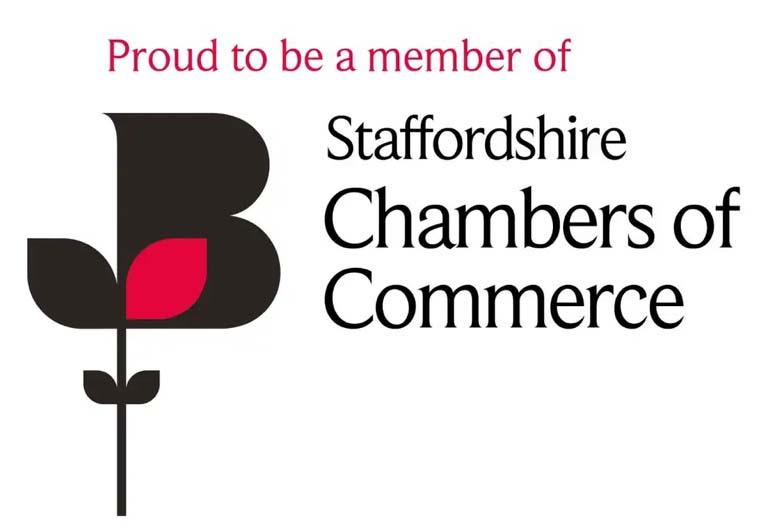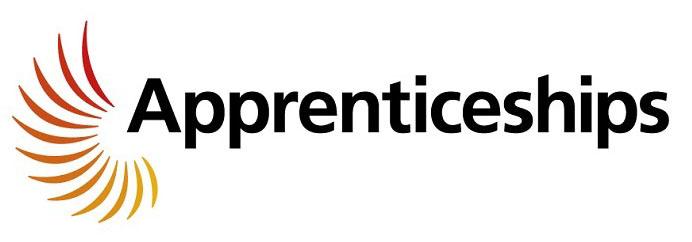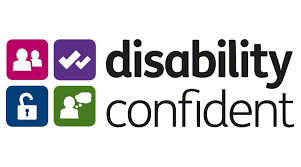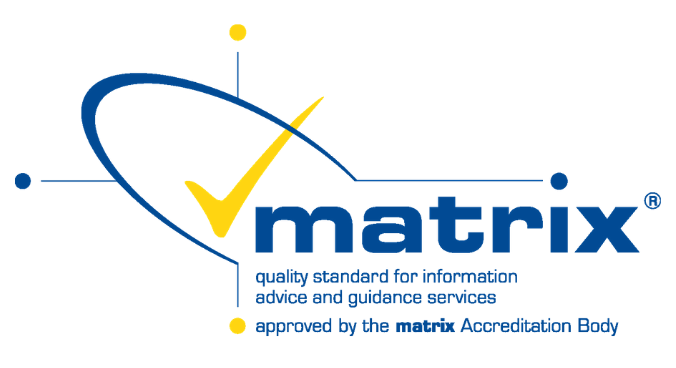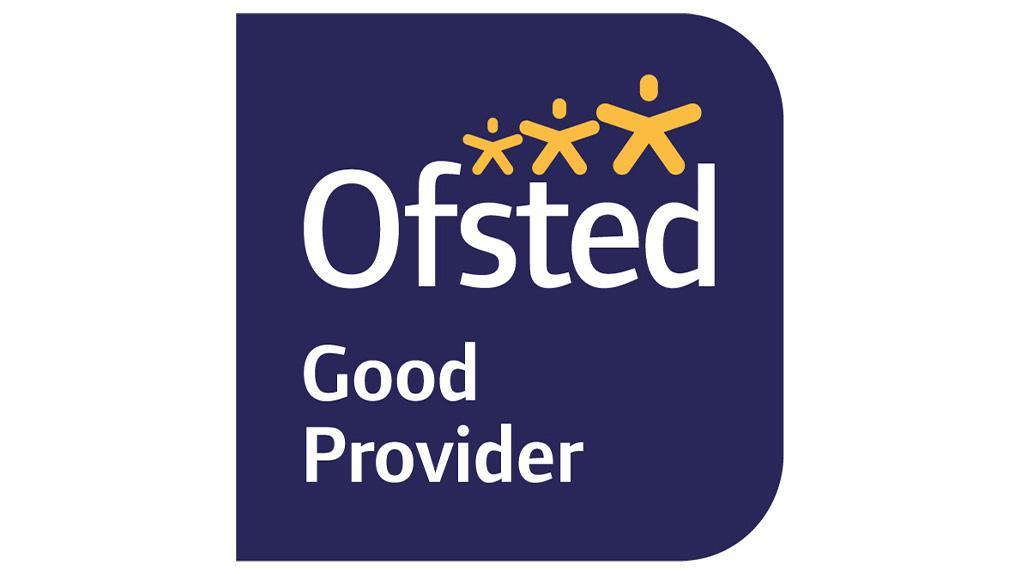
Complaints Policy
Introduction
North Staffordshire Engineering Group Training Association (NSEGTA) is committed to delivering an excellent experience to its learners, employers, stakeholders and the local community and is dedicated to providing the best possible training and service.
Our learners and employers’ views are important to us and help us to ensure that the training and services we provide are of the highest quality and consistently meet the needs of all our stakeholders. We want to make our training and services as efficient and effective as possible and to do this we require feedback on it being fit for purpose or recommendations on how we can improve it.
Our aim is to take account of all opinions; whether it be positive / complimentary feedback, as well as taking seriously any areas of concern or dissatisfaction, which may result in a formal complaint / appeal.
NSEGTA will listen carefully to all feedback and respond promptly should a complaint be raised with us. We actively encourage regular and honest feedback and any stakeholders can contact us in a number of ways, via our questionnaires, verbally at face to face review or company visit and in writing via email or letter should they be dissatisfied with their training or the service that we have provided.
This policy is explained to employers / learners at induction and a contact card is provided which contains key contact information.
The purpose of this policy
We also welcome the positive / complimentary feedback, particularly relating to our staff or the training and services that we provide.
The purpose of this policy is to set out our commitment to ensure that the services we provide are of the highest quality and consistently meet the needs of our stakeholders.
NSEGTA defines a complaint / appeal as an expression of dissatisfaction which merits a response.
This policy aims to ensure that due consideration is given to:
- all feedback received about any aspect of NSEGTA’s performance around its core purpose of providing training or a service
- that learners, employers and stakeholders are aware of how to make a complaint / appeal
- that the policy, procedures and guidelines clearly set out the arrangements which NSEGTA has for the investigation and resolution of a complaint / appeal
- that a constructive approach is applied and maintained and that, wherever possible, there is a positive resolution to any complaint
- that mechanisms are in place to enable stakeholders to provide positive feedback / compliments, which when received are disseminated appropriately
Principles
The general principles of this policy in relation to complaints are:
Complaints / appeals will be handled sensitively. Any person named in a complaint will be informed of the complaint / appeal and will have the right to reply as part of the investigation. Information contained within the complaint / appeal will be made available only to those involved in its resolution.
Except in exceptional circumstances, every attempt will be made to ensure that both the complainant and NSEGTA observe the confidential nature of issues. However, the circumstances giving rise to the complaint may be such that it might not be possible to maintain confidentiality and each complaint will be judged on its own merit. Should this be the case, the situation will be explained to the complainant and/or their representative.
Similarly, depending on the circumstances, where a complaint leads to disciplinary action against NSEGTA staff, NSEGTA may need to keep some aspects of the disciplinary action and/or outcome confidential.
Decisions made as the result of an investigation will be fair and justifiable.
In the case of a learner who is aged below 18 raising a complaint, we may be obliged to inform their parent / guardian.
Where the same complaint / appeal is raised by a number of individuals at a similar time, this will be treated as a single complaint. If a group of learners submit a complaint it may be appropriate to appoint one learner to act as a representative to liaise with NSEGTA.
No apprentice / learner or stakeholder bringing a complaint / appeal under this policy, whether successfully or otherwise will be treated less favourably than if the complaint had not been made. If evidence to the contrary is found in this regard the member of staff may be subject to disciplinary proceedings under the NSEGTA policy.
All NSEGTA staff have the right not to be subjected to aggressive, offensive or abusive actions, language or behaviour, regardless of the circumstances. In these circumstances, NSEGTA will take any necessary action required to address such unacceptable behaviour, for example; terminate an abusive telephone call, decline to communicate via telephone, require that contact is made with a specific staff member only.
Malicious Complaints
NSEGTA may consider invoking further action in those cases where complaints are found to be malicious. A malicious complaint is defined as a complaint which is patently unsustainable, having been put forward so as to abuse the process of the complaints procedure or, for example, to attempt to defame the name or character of another person.
Anonymous Complaints
Complaints require investigation to enable resolution; where a complaint is made anonymously, it will not be possible to undertake such an investigation. For practical reasons, therefore, normally no action will be taken in the event of complaints made anonymously.
Scope
This policy applies to apprentices / learners, employers and all stakeholders.
It is expected that learners will accept the responsibility for communicating any problems or concerns directly with NSEGTA. However, we recognised that on occasions, or in certain circumstances, complainants may prefer matters to be raised on their behalf by a parent / guardian or other third party.
Where a complaint is received in these circumstances, on behalf of a learner or individual to whom a complaint relates, NSEGTA will only accept the complaint with the written consent from the learner / individual.
Exceptional circumstances may only be made if in the interest of the learner / individual, such as where there is serious concern, safeguarding or potential welfare issue and must be approved by a Senior Manager.
For information on rights and responsibilities with the Data Protection Act please refer to NSEGTA Data Protection Policy.
Reviewing an Assessment Decision
Learners who feel they have suitable grounds to complain or appeal should request a review of an assessment decision in writing and follow the complaints / appeals procedure below.
NSEGTA Employees
This policy is not intended to be used by members of staff. Staff should use the NSEGTA Grievance Policy and Procedures for employees. Further details and advice can be obtained from the Chief Executive.
Former Learners
Complaints from former learners will be considered provided they are associated with issues relating to the training or a services received as a learner of NSEGTA and provided that the complaint is initiated within three months of them leaving. Outside of this timescale, it is at the discretion of the Chief Executive to consider the circumstance of the complaint.
Making a Suggestion
Individuals often feel more comfortable about suggesting improvements rather than complaining formally. NSEGTA has established a number of ways of ensuring that learner and employers have the opportunity to provide feedback. Should an apprentice / learner, employer or any stakeholder wish to make a suggestion to support continuous improvement of the training or service NSEGTA provide, can be done by contacting the Chief Executive, Sarah Stanway, sarah.stanway@nsegta.co.uk
Roles and Responsibilities
The overall responsibility for this policy lies with the Chief Executive and is supported by the Senior Management Team (SMT).
The Head of Operations is responsible for recording the formal complaints and overseeing the complaints management system.
Responsibility of NSEGTA
NSEGTA will:
- acknowledge the formal complaint and aim to respond within two working days
- deal reasonably and sensitively with the complaint
- take action where appropriate
- welcome issues being brought to its attention to enable it to improve its training and services.
Responsibility of the Complainant
The complainant will be expected to:
- bring their complaint to NSEGTA’s attention, as quickly as practicably possible
- explain the problem as clearly and as fully as possible, including any action taken to date
- allow NSEGTA reasonable time to deal with the matter
- recognise that some circumstances may be beyond NSEGTA’s control.
No formal responses are necessarily required for compliments, unless permission is required for use for marketing purposes.
Responsibility for Action
The Chief Executive and the Head of Operations is responsible for investigating the complaint and implementing the appropriate action.
All NSEGTA staff are responsible for the delivery of the complaints / appeals procedure.
Implementation Arrangements
All new members of staff are made aware of the policy and procedures during the formal staff induction process and any identified training is undertaken.
This policy is published on our website at www.nsegta.co.uk and can be provided in alternative formats on request.
Any updates or amendments to the policy and procedures are disseminated to all NSEGTA staff along with the necessary training.
Monitoring and Review
The Complaints / appeals and Compliments Policy is subject to regular review. This policy will be reviewed annually along with the Complaints & Appeals process and procedure. This review will also take into account the views of our apprentices / learners, employers and other stakeholders and if deemed appropriate the necessary changes will be implemented.
The Head of Operations will track the progress of all complaints / appeals and will submit an annual report to Senior Management Team summarising the complaints / appeals and outcomes.
Approved and signed by:
Sarah Stanway
Sarah Stanway
Chief Executive
Reviewed 1st April 2025
(to be reviewed January 2026)
Complaints and Appeals Procedure
1. Purpose
To investigate an apprentice / learner, employer, parent or any other complaint or appeal efficiently and effectively and to implement the agreed outcome immediately. The procedure is designed to resolve any disputes as fairly and efficiently as possible.
This 4 stage process outlines the potential key points of the complaint / appeal process.
The expectation is, in most cases, complaints and appeals will be resolved informally at stage 1 or formally at stage 2. If this is not achieved, then there is contingency to progress a complaint further up the hierarchical chain.
2. Scope
All individuals undertaking an ESFA funded programme or any other complainant.
3. Responsibilities
NSEGTA staff are responsible for acting immediately and professionally to record a Complaint / Appeal. It is their responsibility to escalate the Complaint / Appeal to the Chief Executive who will investigate it and agree the remedial action.
4. References
- Complaints form
- Complaints file
5. Procedure
This procedure is defined under the following heading:
Complaints and Appeals Procedure
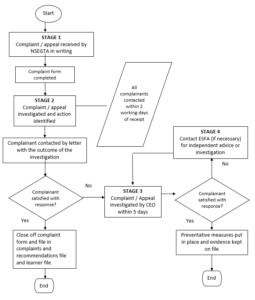
Complaints and Appeals process
Apprentices / Learners, employers, parents or any other Stakeholder may wish to make a complaint or appeal against a decision with regard to any aspect of the training programme and this procedure is designed to resolve any disputes as fairly and efficiently as possible.
The apprentices / learners Complaints and Appeals procedure (as below) is discussed during the sign up / induction process with the Training Officer / Trainer and is duly signed and dated by the apprentice / learner to confirm their understanding.
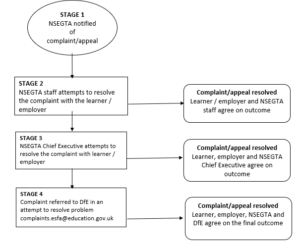
I HAVE READ AND UNDERSTAND THE COMPLAINTS AND APPEALS PROCEDURE

